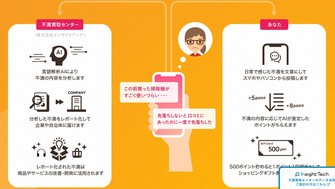
Complaints have the potential to become seeds of innovation. (Getty Images)
TOKYO — Every day, a company in Japan receives some 15,000 complaints — a number you’d think would tire even the best listener — but in fact one company values and even buys these gripes.
The firm, Tokyo-based Insight Tech Inc., uses these complaints to provide business support, making full use of artificial intelligence. Its 50-year-old President Tomohiro Ito explains, “Complaints are seeds for innovation.”
Actively purchasing complaints
“The boxes are absurdly large relative to the product size, requiring dozens of crumpled pieces of paper to fill the gaps. / It’s really a hassle to spread them out and fold them for recycling. / Please reconsider the box sizes.” This outpouring of discontent was fielded by Insight Tech’s “complaint purchase center” regarding Amazon delivery packaging. Another user dissatisfied with airplane toilets complained, “Couldn’t they be a bit roomier? It’s really tough to enter them with a kid.”

This photo provided by Insight Tech Inc. shows company President Tomohiro Ito.
The term “complaint” often conjures up negative images of customer harassment or claims against firms. However, not all complaints are unreasonable; in fact, many may have the potential to spark innovation.
If a company’s complaint platform isn’t functioning, it can trigger further dissatisfaction, with people wondering, “Is my voice being properly heard?” or thinking, “They won’t listen anyway,” and this in turn can lead to harassment by customers.
“We want to leverage digital power to become a receptacle for a wide range of voices,” Ito says. He wants to play the role of picking out seeds of innovation that lie within the complaints.
Not just ‘venting’
How does Insight Tech’s “complaint purchase” service work? First, people register free of charge from the company’s website or smartphone app and set up a profile. After doing this they can post their frustrations. However, that doesn’t mean any complaint is OK; each must have its value assessed. Inappropriate posts such as those containing sexual expressions or which defame individuals are naturally ineligible for purchase.

This image from the website of Insight Tech Inc.’s “complaint purchase center” shows a specific complaint about a person’s hesitancy to open a window for ventilation due to fears a baby’s crying could inconvenience neighbors or lead to reports of abuse.
Successfully “bought” complaints earn 1 to 10 points per post, and members can exchange 500 points or more for online shopping gift codes.
This isn’t just a “venting” service for stressed modern individuals. Insight Tech launched its complaint purchasing service in 2017, utilizing Ito’s experience in big data marketing and AI-driven business development. Membership has grown to approximately 750,000, with about 45 million complaints submitted to date.
Companies and other parties enter into contracts with Insight Tech to analyze the “trends” of complaints related to their own businesses, whether directed at them or others, using analytical tools. The goal is to uncover hints for product development or improvement from the raw voices of consumers and others in society.
Turning complaints into products

This image provided by Insight Tech Inc. shows the product “Blendy The Litre,” which was inspired by complaints fielded by the company’s complaint purchase center.
There are actually cases in which complaints fielded by the company have given rise to hit products. One example is Tokyo-based Ajinomoto AGF Inc.’s “Blendy The Litre” drinks. They were inspired by complaints that emerged during the COVID-19 pandemic about beverages. As people stopped going out, bulk buying increased. With families spending more time at home, beverage consumption rose. Multiple bottles were heavy to carry home, storage space was limited, and waste increased. Such opinions arrived one after the other, which led to the development of a new series of flagship products, where one stick of powder could make a liter of instant drinks like green tea.
Beyond food
Tokyo-based France Bed Co. used the complaint purchase center’s data for product development targeting people in their 20s. They found complaints about the placement of outlets for smartphone use in bed, leading to a new product that sold four times more units than usual.
Separately, an employee from Ikehiko Corp., a company based in the western Japan prefecture of Fukuoka that manufactures and sells interior goods and bedding, analyzed over 1,000 complaints about its futon blankets used with heated “kotatsu” tables. Many complaints were about futons being pulled to one side or otherwise moving from their original place, leaving the person on the opposite side cold. This led to the idea of attaching strings to secure the futon to the table legs to prevent it from shifting.

This screenshot from the official site of Insight Tech Inc.’s “complaint purchase center” explains the complaint purchase process.
Complaints aren’t always directed at tangible products. They also address various social issues, such as caregiving, education and even loneliness.
The world is overflowing with discontent. For Ito it gives him an awareness of the importance of his company’s role as a receptacle.
“We want to deepen collaborations with municipalities and take on a hublike role in solving social issues,” he says.
(Japanese original by Kohei Chiwaki, Digital News Group)


AloJapan.com